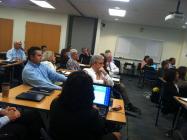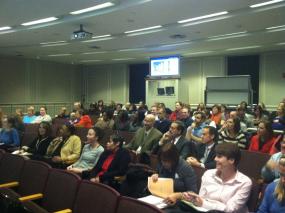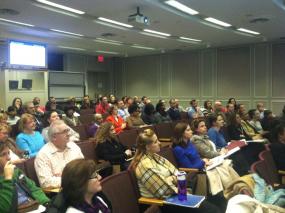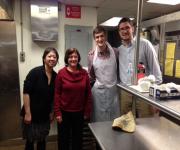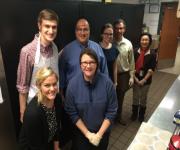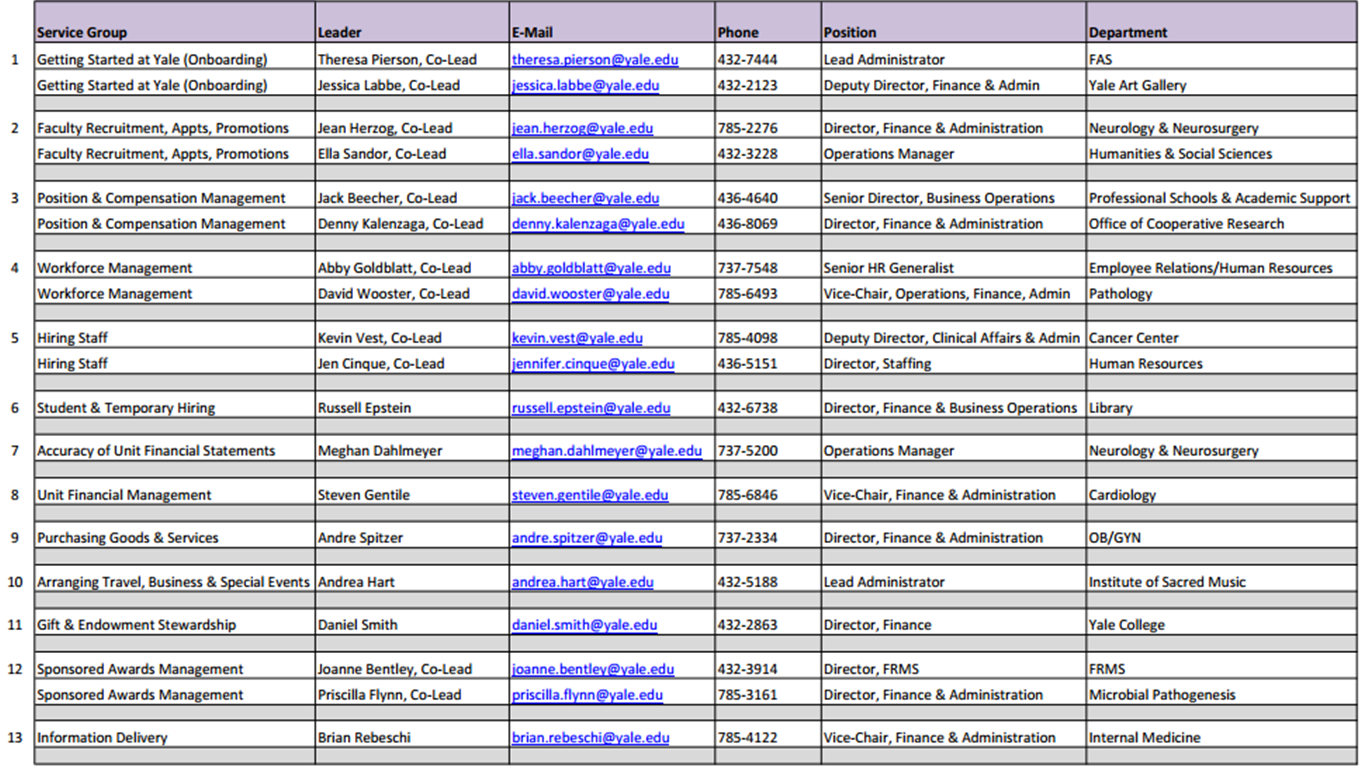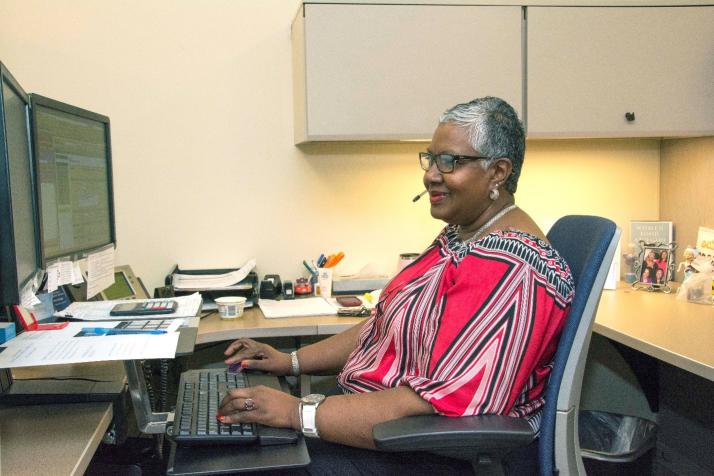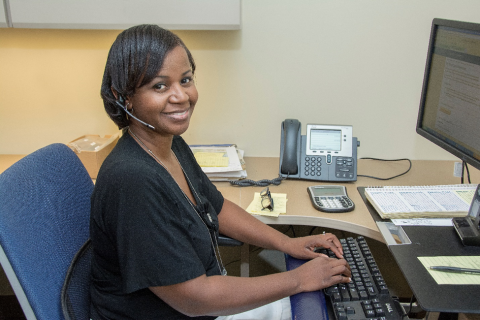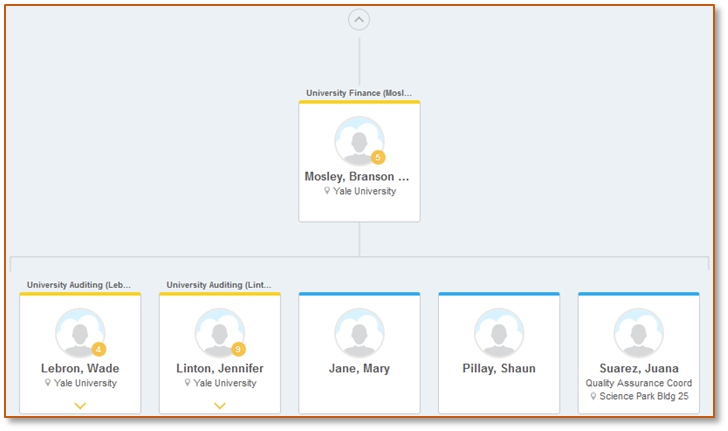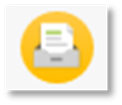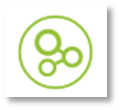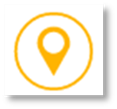You are here
Welcome! to the first edition of our bimonthly e-newsletter, Workday@Yale, with news on the University’s transition to the campus-wide unified Human Resources, Payroll and Finance information system, Workday. The Workday@Yale newsletter is one way we will keep you informed with insights and updates. We are excited to begin and look forward to working with and hearing from you. Please send your suggestions, comments and feedback to the Workday@Yale.edu email.
Workday is a next generation business system that will enable Yale University to improve the delivery of business services across finance and human resources functions.
FAQs
You Asked. We’re Answering.
For answers to your frequently asked questions such as “who is on the Workday@Yale program team"?, "how are you engaging the community?”, “when will Workday be launched?”, please refer to the FAQs section on our website.
What’s Been Happening?
- Discovery Workshops - We are currently in the Vision and Plan phase of the program. In order to begin documenting our current practices and challenges, we have been conducting discovery workshops for Human Resources (HR), Payroll and Finance. These workshops help define our current processes and experiences, allowing us to gain a deeper understanding of our current operating structure and needs, so that we can best plan for our transition. Community input, especially knowledge and feedback, is essential to the success of this program. To view a list of attendees, and a brief description of the workshops, please visit the Discovery Workshop section of the website. We will also be posting presentations from the various workshops soon.
- Service Groups – Service Groups will begin forming later this fall to help ensure new administrative processes meet the community’s expectations and to serve as a focal point for building a strong community understanding of the Workday system. Each group will be assigned an individual administrative service to evaluate from the end users’ perspective, including staff and faculty in the academic and research areas as well as central process owners. Groups will also help create multiple processes to fit cohesively together to form end-to-end administrative services that are efficient and compliant and also support teaching, research and service at Yale. Additionally, team members will balance the need for standardized processes that enable the unique requirements of individual academic and administrative departments.
-
Program Vision Statement - On Tuesday, September 3, the Steering Committee members and Workstream Leads developed a draft vision statement during an interactive session. The vision statement will support a successful implementation by functioning as a filter where decisions can be considered. Moving forward, the Steering Committee will help support the vision statement and review and develop updated program objectives, guiding principles, and communication plans. Congratulations to all those that participated in the session for their excellent work!
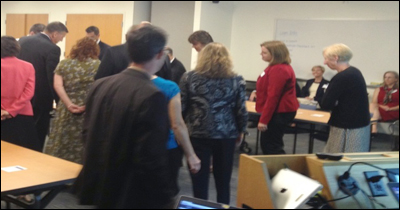
The picture depicts the beginning of the session with the participants up and moving during an icebreaker activity. - Overview of Workday to Senior Leadership - On Monday, August 26, Yale Administrative Leaders were provided with an overview of Workday which included topics on human resources, payroll, financials, security and reporting. The session was well-received by the leadership in attendance, kudos for a job well done!
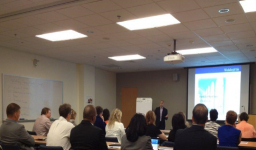
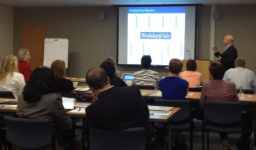
The People Behind the Program
Meet members of the Program
View the current Workday@Yale Program Team org chart
 Marc Ulan, Workday Program Co-Lead
Marc Ulan, Workday Program Co-Lead
As the co-lead of the Workday program, Marc shares responsibility for the successful transition from our current systems to Workday. In addition to his responsibilities on the Workday program, and as the Associate CIO for the Business Systems Group, Marc also has responsibility for the day to day operations and improvements to Yale's finance, HR, payroll, faculty lifecycle, business intelligence, and data warehouse systems. When asked what was one of the key selling points for choosing Workday, Marc responded “this is a powerful, intuitive, cloud-based system which will move us toward the innovative technology arena where a University such as ours should be.” When not at work, Marc enjoys spending time with his wife and 6 year old son, playing ice hockey, and racing cars on road courses in the New England area.
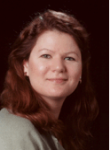 Jacqueline Tucker, Workday Program Co-Lead
Jacqueline Tucker, Workday Program Co-Lead
Jackie is Senior Director of Business Solutions for the Division of Finance, and co-lead of the Workday program. As chief steward for University’s financial applications and business intelligence systems, the Workday project is more than just a technology change, it “is our chance to make some fundamental improvements to how we work and support the missions.” Jackie also notes that while you need a lean and nimble team to execute core project activities, the program is reaching out far and wide across the Yale community to engage as many people as possible in shaping the outcome. You can look forward to hearing from Jackie and the rest of Workday team a lot more over the next few years!
Did You Know…Yale is one of a select group of institutions who will be working with Workday to design new functionality just for higher education?
Welcome to the second edition of our bimonthly e-newsletter, Workday@Yale, with news on the University’s transition to the campus-wide unified Human Resources, Payroll and Finance information system, Workday. Workday is a next generation business system that will enable Yale University to improve the delivery of business services across finance and human resources functions.
The Workday@Yale newsletter is one way we to keep you informed with insights and program updates. We are off to a great start and look forward to working with you and hearing from you. We welcome suggestions, comments, and feedback, so feel free to send them to us at Workday@Yale.edu.
-
View the program's Vision and Plan Roadmap
-
View the current Workday@Yale Program Team Org chart
What’s Been Happening?
Discovery Workshops
- What are Discovery Workshops? Discovery Workshops help the program team understand Yale’s current business processes and experiences, allowing the program to gain a deeper understanding of how things currently work and where there are opportunities for improvement. These workshops are designed to orient everyone involved to the current state of operations so that we can plan for the best transition possible. Community input is essential to the success of the Workday@Yale program and these workshops are an important channel for such input.
- How many discovery workshops have there been? A total of seventy nine sessions were held over six weeks, covering business processes across Human Resources (HR), Payroll and Finance. Over 400 community members attended the workshops and expressed that the sessions were very helpful to both the program team and community participants. The Discovery Workshop section of the website includes lists of attendees, brief descriptions of the workshops and presentations from the various sessions.
Service Groups
- What are Service Groups? Service Groups are community led focus groups that will help ensure that Yale’s new administrative processes meet the community’s needs and expectations. These groups are currently being formed and will serve as focal points for building a stronger community understanding of the Workday solution.
- New Service Group Director Announced. Effective November 1, Sandy Stein has accepted the position of Service Group Director within Business Operations. Sandy comes to this role as the director of Finance and Administration in the Department of Diagnostic Radiology, a position she has held for the past nine years. In addition to her administrative role overseeing operational and financial activities in the department, she has been an active participant in several Medical School and Business Operations committees, including the Operating Group, which advises university business processes, policies and communications. Sandy will lead and manage Yale’s new community driven service groups that will help to design business practices that optimize the delivery of high quality community focused administrative services for the Yale community.
Workstream Leads
- What is their role? Workstream Leads have been identified to help design, structure, and implement the Workday program. Workstream Leads provide day-to-day leadership for the teams that will execute the tasks of the program. These teams assume responsibility and accountability for the coordination and delivery of the program, lead the delivery of all functional aspects of the program, make business and financial process decisions, and assign dedicated staff members to various roles and responsibilities.
- Who are they? Workstream Leads include: Nancy Creel-Gross (HCM/Payroll), Lucy Lucker (Finance), Lourdes Reyes and Kathleen Broderick (BI/DW & Reporting), Darrell Cook (Technology), Karen Rossetti (Security & Controls), John Mayes II (Interim Change Management), Brent Dickman (Interim) and Sandra Stein (Service Group Leadership).
Stakeholder Analysis
- What is Stakeholder Analysis and why is it important? Stakeholder analysis is an organized method of identifying individuals and groups impacted by a change initiative or those who can affect its success. Stakeholder analysis will help lay the groundwork for targeted communications and training as well as determining what actions will be required to motivate individuals or groups through change process.
- How will Stakeholder Analysis be used? Yale Lead Administrators recently participated in a three-hour Stakeholder Analysis course, which was the first of several modules in the Change Leadership curriculum. The Change Leadership curriculum is specifically designed to support Lead Administrators in managing upcoming Workday changes in their organizations. In this module, participants received an introduction to Change Leadership concepts and in-depth instruction on Stakeholder Analysis methods as well as tools in an interactive, hands-on learning environment.
- Who will use Stakeholder Analysis? Each Lead Administrator was asked to complete an awareness and readiness assessment (Stakeholder Analysis) for their unit by October 31, 2013. The assessments are being used to inform the Program’s community engagement and communication plans. We’d like to thank the entire Lead Administrator core for their insights, participation and strong support of the Workday program. Kudos to our earliest responders, Donna Espenberg and Lisa Merola-Grimm, who returned their analysis within the first week!
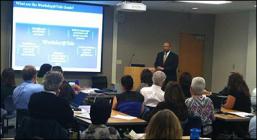
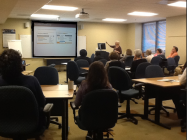
- Left: John Mayes, AVP Procurement and FBO Change Leadership & Communications, speaking about change leadership and how it ties into stakeholder analysis training.
- Center: Lead administrators receiving instructions for hands-on exercises during stakeholder analysis.
- Right: Nancy Creel-Gross giving a Workday update to members of the HR community.
Community Perspectives
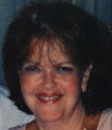
Jaci-Beth Ward, Associate Director, HR Business Solutions, and HR’s primary liaison for Workday@Yale commented:
“When asked why Yale is implementing Workday when our current system is seemingly working well, I respond by asking if they are driving the same car they drove 15 years ago. Most are not. Even if they were driving a 15 year old car in perfect working order, I’m sure that folks, without even realizing it, would be compensating for its shortcomings. Driving a brand new car, which is energy efficient and has state-of-the-art functionality, makes driving easier, less costly, safer, and more enjoyable. It is our responsibility to support our prestigious faculty in their mission to educate the best and the brightest, and how better to do that than to implement a system that will allow us to work smarter and increase our efficiency and thereby save money. Workday will enable us to reduce the number of steps it takes to get something done and eliminate the submission of paper forms for most Human Resources transactions while providing much needed information more easily. The Workday program is well-organized and moving at a quick, but manageable, pace which makes all involved energized and committed to the success of the program. And yes, Workday is fun!”
Conversations with Lead Administrators
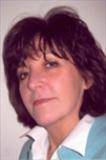

Change Management (CM) recently sat down with two lead administrators, Susan Wells (Left) and Priscilla Flynn (Right), on separate occasions to discuss current efforts around campus to enable Yale’s transition to Workday. As key players in prior Enterprise Resource Planning (ERP) and change management initiatives, Ms. Flynn and Ms. Wells offered valuable insight into Yale’s current transition. Not surprisingly, both demonstrated the commitment to excellence and innovation that is emblematic of their departments and of Yale’s many lead administrators.
CM: Tell me a little bit about yourself and about your work at Yale.
SW: I am the Lead Administrator at the School of Forestry and Environmental Studies. I started here the same day Kroon Hall opened in January 2009. But I had been at the university before in the controller’s office. During that time I worked on the most recent Enterprise Resource Planning (ERP), Project X, when we put in Oracle. In the intervening seven years, I was at Connecticut College where we also had a full-blown ERP project.
PF: I am a Lead Administrator for Microbial Pathogenesis at the School of Medicine. I’ve been here for about eight years. Prior to this, I was with a startup biotech company, and way before that I was in restaurant management. So I’ve been in management pretty much all of my life.
CM: What are you most encouraged about with the approach taken by Change Leadership versus other strategies used by Yale in the past?
SW: I’m most encouraged by the inclusiveness that I already see at this early stage. This new concept of using a service group structure, and not just the central process owners designing everything, is very different. I think it’s going to reap good rewards at the end of the project. The other thing, of course, is this rigorous stakeholder analysis process that’s going on. I know it’s going to have the benefit of us starting to think about who needs to be engaged and what possible opportunities and challenges might arise. But even beyond that, the stakeholder analysis meeting itself is a team building exercise, and getting buy-in from that core business office team will make them feel included, and as a lead administrator, I feel included. So I think that’s really smart. The whole buy-in concept is amazing.
PF: In general, I think this is the perfect approach for this place. And I think the university has put a lot of time in the last couple of years identifying what a lead administrator is, helping them understand their role and making sure they have training. This is the first time that I think they’re treating us like lead administrators because it’s our job. It’s our job to support the mission, lead change, and make these things work, and I don’t think it’s always been done that way. So I think this is perfect.
CM: What do you think would be some of the best ways to engage the community in order to create enthusiasm about the transition and to overcome any possible fear or resistance?
SW: Well, I think it’s just the basics. Communicate early and often. Address any adverse reactions by looping people in early and getting that buy-in. Make sure to under-promise and over-deliver. One thing that I think we sometimes run into, not just at Yale, but everywhere, is missed deadlines. That’s sort of a trust breaker. I understand that there are realities where if you’re running into problems you just can’t perform. But I think it’s important to regain the trust of some of the population and constituents. As I say, under-promise and over-deliver.
PF: In the school of medicine we have clusters, the basic sciences and the clinical groups, and those are monthly meetings and those are lead administrators. We’re support groups for each other. A lot of times in those clusters we help each other work things out. So not only are we building this network of people that can help with change, but we can also support each other during the whole process. I think everyone is actively engaged, I think everyone is excited about it, and I don’t think that they’re hesitant to change.
CM: Any additional pieces of advice you’d like to offer up to the Workday@Yale program or the Change Management team?
SW: I like the approach of using lead administrators to carry the charge, since we’re already those people around the university in our units to whom people look for guidance and to help explain what’s coming down the pike and what to know to do one’s job. And our business office staff people will help set a positive tone, too--they are amazingly dedicated and talented.
PF: You know not everything is going to work right. I’m hoping that we can have open conversations and say “You know what, maybe that one little piece isn’t right, and maybe we do let that go, or we change that.” So I think the lesson would be that it’s not all going to work and for us to be ready to admit it, move on, change something, or go with plan B.
CM: Any final comments?
SW: It’s early days, but I think that laying the ground work early is so important and so far I’m very happy and impressed.
PF: I think we all have to understand that when you’re hired into a management position you represent the organization as a whole. And what’s best for the organization is almost always best all the way down to the department level and to the people level. I think people forgot that, but I try to always keep that in mind. It’s hard sometimes because you’re pulled from both sides, but you have to remember that that’s what your job is, that’s what you were hired for, and that’s why you went into management to begin with.
Did You Know…Workday uses a leading-edge technology technique called "in-memory" processing, where the entire application and all of the data are loaded into resident memory. This helps Workday achieve lightning quick response times, even when performing complex business processing or accessing large volumes of data.
QUOTE of the DAY
“I have been impressed with the urgency of doing.
Knowing is not enough. We must apply.
Being willing is not enough. We must do.”
-Leonardo da Vinci
Welcome to the third edition of our bi-monthly e-newsletter, Workday@Yale, with news on the University’s transition to the campus-wide unified Human Resources, Payroll and Finance information system, Workday. Workday is a next generation business system that will enable Yale University to improve the delivery of business services across finance and human resources functions.
The Workday@Yale newsletter is one way we will keep you informed with insights and program updates on an ongoing basis. We are off to a great start and look forward to working with you and hearing from you. Please send your comments to us at Workday@Yale.edu.
View the program's Implementation Plan Roadmap
What’s Been Happening?
The Workday@Yale program offered a Workday Overview auditorium session at the Yale School of Medicine on Wednesday, December 11, 2013. The informational session, presented by Jacqueline Tucker, Program Co-lead, focused on the Workday@Yale Program, the Workday solution, program objectives, approach, and timeline.
If you missed the December 11 session, there will be additional sessions such as these across the Yale Community in the near future.
On January 29, 2014, The Workday@Yale program held a Lunch and Learn at 25 Science Park. The informational session, presented by Marc Ulan, Program Co-lead, highlighted accomplishments from the vision and planning phase and provided updates on Program objectives, approach, and timelines. The session was recorded and can be found on the website along with the presentation.
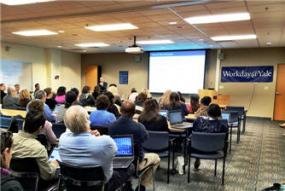
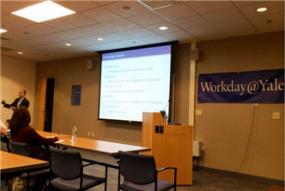
Lending a Helping Hand
On January 14, 2014, The Workday@Yale program team banded together to offer a helping hand at Columbus House, a Connecticut-based, non-profit organization that is passionate about working together to end homelessness. The team helped with food preparation service and even cleaned a few dishes!
Community Perspective
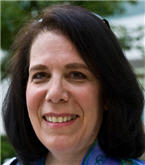
The Workday@Yale Change Management (CM) team recently spoke with Sandra Stein, Service Group Director for Finance and Business Operations, to discuss Service Groups and how they will partner with the Workday@Yale program to help facilitate a successful transition to the Workday system. Sandra, more commonly known around the Yale Community as Sandy, has worked at the University for 13 years in the School of Medicine. For the past nine years, Sandy served as Lead Administrator in the Department of Diagnostic Radiology, a role which provided her with a fundamental understanding of business process and system requirements from an end user's perspective. Her appreciation for the user’s needs allows her to serve as both an intermediary and facilitator for the Service Groups on the Workday@Yale Team.
CM: What role will Service Groups play in the Workday@Yale Program?
SS: Each Service Group will help us think collectively about how the University can create a more service-oriented culture. They are a community engagement vehicle to champion new processes and define value from the user point of view as well as identify the desired service levels. The primary goal of the service groups is to improve overall user satisfaction with services that support the administrative and financial work that is done every day at the University. The focus of the Service Groups is on end-to-end service design, which incorporates the changes that will evolve from the Workday implementation. Review of the revised business processes in Workday with the user in mind will enable us to streamline our workflow and provide improved services to faculty, staff and students.
CM: What are the key factors that will enable Service Groups to be effective?
SS: Service Groups will include approximately ten members—a leader and general members—with representation across the University and down into the organization (i.e. administrators, managers, staff and faculty, etc.). Staff members will be nominated through a web-based form, and must be approved to participate by their Lead Administrator. Sign-off by Lead Administrators indicates that their staff member is well-qualified to serve on the group, possesses strong communication skills and is a team player with an institutional view. This process will enable Service Groups to be most effective by ensuring membership is well-rounded with individuals who are capable of making significant contributions to the group. The training that will be available to the Service Groups as well as the administrative support from Business Operations will contribute to the success of these teams.
CM: How is Yale’s approach for the Workday transition different from other strategies used in the past?
SS: I think the critical difference between Workday and past large-scale implementations at Yale is the expanded focus on Service Groups and Change Management. There is a tangible interest in making administrative work easier and more efficient for the user, by including the user in the review and design of the services. I also think engaging the Service Groups at the right time and training them to analyze changes, make suggestions, and understand the new workflow look and feel is extremely important.
CM: Any final comments?
SS: The current emphasis on Change Management, and training and developing the skills of the Service Group teams, creates a new resource for the Yale community. It is my personal belief that we can identify a common core of business and service requirements that works for at least 80% of the users, no matter where you’re located on campus. The Service Groups will have the opportunity to identify these commonalities across a service which will facilitate the simplification and standardization of how administrative services are provided to faculty, students and staff.
Perspective from the Workday@Yale Program Office
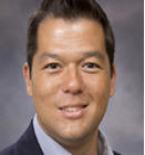
The Workday@Yale Change Management (CM) team sat down to interview Ryan Schlagheck (RS), Program Director for the Workday@Yale Program. We asked him about his background, his current role, and his views on what the cloud-based Workday solution means for Yale.
CM: Can you tell us about yourself, your work experience and when you started working at Yale?
RS: I have been at Yale just over a year and a half serving in the role of Program Director for the Workday@Yale Program. Prior to Yale, I spent ten years in Healthcare IT and worked in support of the first and second rounds of healthcare reform, first with HIPAA and the Patient’s Bill of Rights, and recently with the Affordable Care Act. I held a number of Program Management roles, including the plan, build and run phases of several technology transformation programs and have also led large, global application development and production support teams. Prior to that, I was a management consultant doing primarily integrations and systems development work in a variety of industries, including Supply Chain Management and Distribution, Marketing and Merchandising, and Printing and Publishing.
I had worked on ERP implementations very early in my career but held only cursory knowledge of Higher Education as an industry, so the opportunity to come to Yale and make a meaningful contribution, while gaining exposure to how the University operates was too good an opportunity to let pass. And, Yale is an amazing place with a rich history, and it sounds cliché, but I really do get to meet and work with many interesting people with very different backgrounds. It’s very exciting.
CM: Can you elaborate on your role at Workday?
RS: As the Program Director for the Workday@Yale Program, I am responsible for the scope, schedule, cost, resource management, and quality aspects of the Program. Simply put, it means I am the person responsible for keeping close tabs on the health of the Workday@Yale Program, where the attributes I just mentioned are the program’s ‘vital statistics.’ The Program is made up of several teams, all working within and across each other to deliver value and benefit to the Yale Community. As a result, a key part of my role is to make sure that’s happening, that everyone has what they need when they need it to get their work done, and that barriers to progress are removed before they cause a problem. Finally, I am responsible for ensuring we are spending the right amount of time, money and resources on the right things at the right time.
CM: What can people around campus expect within the next 6 months to a year with regard to the transition to Workday?
RS: In the next six months, the members of our Yale Community can expect to hear from various Workday@Yale Program leaders about the ways Workday will be different, better, simpler, etc. In addition to engaging the Community in a dialog on how Workday will change the way we work, members of the Yale Community will also have the opportunity to see prototypes we’ve built during the development cycle and will be invited to check out free trainings. Looking a little further out, in a little over a year from now we will be readying the Yale Community for our first Workday release. The campus can anticipate a targeted Go-Live date during the second quarter of 2015.
CM: What are some of the challenges facing a large-scale ERP project like this?
RS: While there are several I could pick from, the biggest challenge I see for us, which is a challenge common across all large implementations, is managing scope and making sure we deliver what we said we would, when we said we would. This can be very difficult – our current financial climate and existing system complexities present some very real challenges we need to overcome to achieve success. The Program’s Steering Committee has been very supportive of the approach, timeline and investment required to deliver this important work, and I’m confident their support will continue as long as the Program continues to deliver value and benefit to the Community.
CM: What are some best practices and strategies for Yale moving forward?
RS: I don’t think anyone would disagree with me that Yale is a complex place. And this is coming from a person who worked in the healthcare sector for a decade! I don’t know if it’s a best practice so much as an operating principle, but I think we need to look for ways to make things simpler in everything we do. I am formally trained as a Six Sigma Black Belt, and while the words sound fancy, the fact is that it taught me how to think about simplifying processes so that they add value to someone or something, rather than adding administrative burden. So if there was something I’d want to keep at the front of our minds as we design the future of our HR, Payroll and Finance systems, it would be to simplify, simplify, simplify while ensuring the end user receives a real benefit from the process.
As a closing remark, I just want to add that I and my colleagues on the Program very much look forward to rolling up our sleeves and working shoulder-to-shoulder with members of the Yale Community on this important endeavor. Personally, I consider it a privilege to work within and among some the brightest faculty and staff in academia to deliver this Program to the Yale Community.
Did You Know…Workday uses a leading-edge technology technique called "in-memory" processing, where the entire application and all of the data are loaded into resident memory. This helps Workday achieve lightning quick response times, even when performing complex business processing or accessing large volumes of data.
QUOTE of the DAY
“Things work out best for those who make the best of how things work out”
-John Wooden
Welcome to the fourth edition of the Workday Program Newsletter, your one-stop shop update for all Workday-related activities! In this issue, we will discuss several key Workday concepts and provide an update on Service Groups and the Program Team’s recent progress. Refer to the Program website to remain informed of all Program activities.
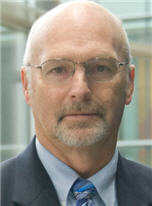
Welcome Richard Bascom!
Effective April 1st, Dick Bascom joined the Workday Team in the role of Change Management Director, dedicated to leading Program change management efforts. With over 25 years of Yale experience, Dick is a well-known and highly respected administrator with a great depth of experience in supporting academic program operations. Please join us in welcoming Dick!
Did You Know…?
You can find a growing glossary of Workday terms on the website. Featured below are several core concepts referenced in the glossary and additional resources on the website:
Workday Landing Page: Landing pages display a variety of icons enabling every day actions such as requesting time off, reporting time and handling expenses. Common landing pages include “My Workday”, “Home” (the one-stop-shop for Employee Self Service and informational needs), and “My Team” (hosts Manager Self Service actions).
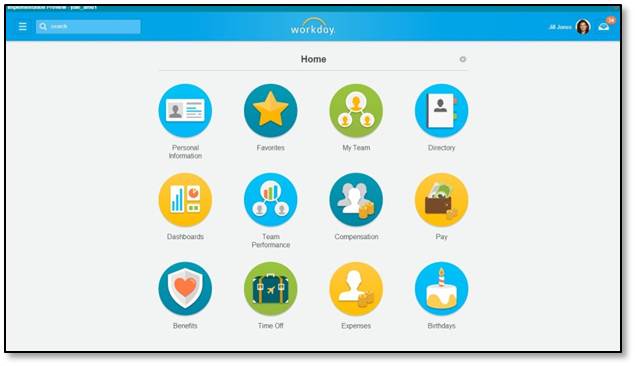
Manager Self Service: In Workday, any Yale faculty or staff member who supervises/manages staff will have a Workday manager role. This role provides managers to access a wide range of helpful job, and position information about his/her team and includes access to numerous built-in reports. Manager Self Service tasks are accessible through Workday’s “My Team” landing page.
Prototype: A Prototype is a working model of the future system. The Program uses prototypes to test and then rework (configure) as necessary until the prototype is ready for system development.
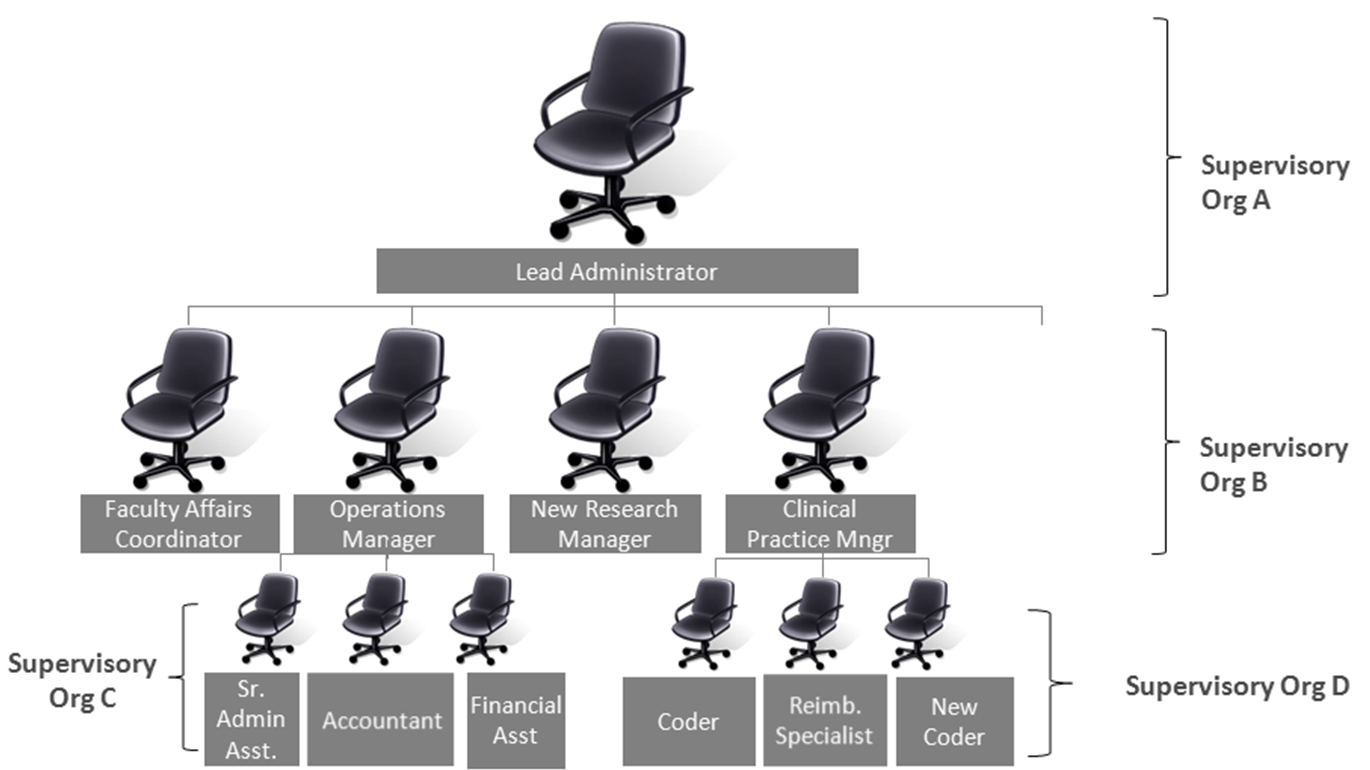
Supervisory Organization: Supervisory Organizations are a foundational structure in Workday. They enable administrative and business support activities in Workday. Workday uses a hierarchical position-to-position structure and all faculty and staff belong to a Supervisory Organization. Examples of Supervisory Organizations include business units, departments, and workgroups. Departments can have multiple Supervisory Organizations, as well as other types of Workday organizations, cost centers, matrix organizations, etc.
Tenant: As a software-as-a-service (SaaS) provider, Workday employs a multi-tenant architecture, meaning a single instance of the application serves multiple customers. This architecture allows Workday to make system updates remotely and at the same time, enables Yale to be on the same version as every other Workday customer. Multi-tenancy will also help Yale stay green—Workday’s centralized data centers reduce energy consumption and use computing resources more efficiently.
Business Design Sessions: Workday delivers a powerful business process configuration tool that helps to define organization-wide business processes. The Business Design Sessions allow us to assess the current state business operations to determine how Workday might support these high level business operations. It also allows us to model changes and improvements to the processes. Representation and input from all workstreams is critical to provide a solution that is workable across campus.
.jpg)
|
Nancy Creel-Gross presenting on March 4, 2014 to members of the HR Community. Nancy was recently named Assistant Vice President, Workday Program and HR Operations. In this position, Nancy will retain her responsibility for Employee Services and Human Resources Information Services, while assuming responsibility for the overall Program strategy, structure, staffing and daily operations. Please join us in congratulating Nancy on her expanded leadership role! |
Workday Program Team Updates
Project Management Office (PMO)
The PMO continues to collaborate with Workstream Leads understand and validate project dependencies, staffing needs, scope and schedules to manage the entire Program. The PMO maintains records of risks, action items, issues and decisions and works closely with each work streams to ensure the success of the overall program.
Human Capital Management (HCM), Payroll and Faculty Support Teams
These teams are busy collecting the remaining configuration data and business process requirements needed to enable workflow, employee and manager self-service. Core People Management and Information, Compensation, Absence Management, Benefits, Payroll, Academic Staffing and Information are on deck for the first Workday Release 1 of HCM and Payroll in the first half of 2015. April 2015 is our target date.
Technology
The Technology Team continues to make progress on identifying the many system integrations and Data Conversions needed for Workday at Yale. Working closely with the HCM, Payroll and Faculty Support teams, these groups are capturing details around departmental system integrations such as SciQuest, STARS and many others important for Workday Release 1. This early work provides visibility into opportunities for consolidation of integrations, needs for new integrations and even integrations that might be eliminated.
Change Management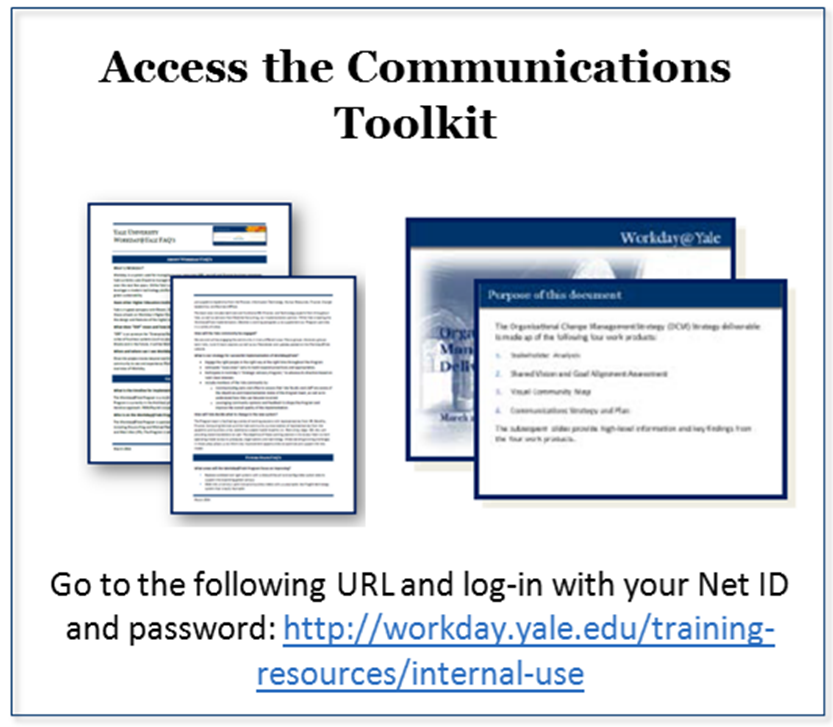
The Change Management team recently participated in HCM, Payroll and other Business Process Design sessions to identify changes that will impact future users. This information will serve as one of many inputs into training design and future program communications. Workday Program Team training sessions will continue to be scheduled over the coming months, utilizing a variety of training delivery approaches (e.g. in-person, virtual, and on demand training).
Finance
The Finance team is focused on the cross functional work needed to support our Release 1 HCM/Payroll implementation. The work includes understanding Workday financial application concepts and identifying dependencies and key milestones. Detailed work is underway on interface needs and the new Workday Financial Data Model (including chart of accounts and other related data elements) needed initially to support HCM and Payroll.
Service Group Updates
New Service Group Leaders Announced!
Service Group Leader nominations and recruitment began in mid-February, followed by member recruitment in mid-March. Members have been recruited for the first three Service Groups, and can be accessed on the Service Groups page, or by clicking here. These new members began training and meetings in May. Phase 2 Service Group Members include: Faculty Recruitment, Appointments, Promotions; Position & Compensation Management; and Student & Temporary Hiring & Lifecycle.
Below is the list of recently of recently appointed Service Group Leaders. If you have questions about the Service Groups, please contact Sandy Stein, sandy.stein@yale.edu.
Staff Spotlight-Anna Maria Hummerstone
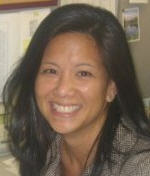
We recently sat down with Anna Maria Hummerstone, Workday Faculty Support Team Lead and Yale School of Medicine Director for Faculty Support, to discuss her role in the Workday Program.
CM: What is your role with the Workday@Yale project?
AMH: I am the Faculty Group Lead and part of the HCM workstream. We are primarily focused on the academic capabilities in Workday - faculty appointments and promotions; faculty tracks; academic pay; and the processes for obtaining appropriate approvals and capturing this information in one source system. We also collaborate with the Office for Postdoctoral Affairs to make sure their needs are addressed.
CM: How does the Workday@Yale Program differ from other Programs employed by Yale in the past?
AMH: A key success factor for the Program has been involving the community throughout the project. Rather than addressing community impact as an afterthought, the Program Team is working to anticipate how changes will be perceived and received.
The prototypes and tenants provide insight into how Workday can positively transform the way we work, but at times, the process to get there can be overwhelming. It’s important to keep the big picture in focus—seeing how things will look as we develop the prototypes in the tenants helps us do that. Sure, we could just hire someone to assemble it for us, but with a large-scale project like this, it is important that you have resident experts who understand how all of the pieces fit together.
CM: Final Thoughts?
AMH: Where we can, we should look for guidance from our peer institutions that have implemented Workday, such as Brown University, Cornell University, and the University of Chicago, and not reinvent the wheel. Workday has great potential to transform how we work and if we’re strategic about how we implement, we could really make some positive changes to how we support Yale’s missions of teaching, research and practice.
Welcome to the Workday@Yale Newsletter, your one-stop shop update for all Workday@Yale activities!
Program Office Update
A Note from Nancy Creel-Gross…
Just over one year ago, the Workday@Yale Program officially kicked off the transition from Yale’s legacy systems to Workday, a unified Human Capital Management (HCM), Payroll and Finance solution uniquely designed for the needs of higher education. Read More
Recent News
Program Team Announcements
Human Capital Management (HCM), Payroll and Faculty Support Teams
The Workday Human Capital Management (HCM), Payroll and Faculty Support teams recently completed reviews of the Release 1 Prototype (P1). Read More
Finance
The Workday Finance team business process design sessions are well underway and the team continues to make progress in the design of future state business processes and the development of business process maps. Read More
Reporting
In June, the Reporting team attended Prototype 1 (P1) business process review sessions and collaborated with other team members to explore how Yale data will function in the new Workday system. Read More
Change Management
Throughout June, the Change Management (CM) team participated in the finance business process design sessions and the Human Capital Management (HCM) business process review sessions for the first prototype (P1). Read More
Community Engagement
Engaging the Yale Campus
Clerical and Technical Community Members Attend Workday at Yale Program Overview Sessions
Members of the Workday@Yale Team recently presented overview sessions of the Workday@Yale program as part of the Summer Training Program for Clerical and Technical Employees. Corey Rossman, HR/Payroll Team member, presented the June 12th session on the medical campus, assisted by team member Christine Viele. Dick Bascom, Workday at Yale Change Management Team Lead, presented the session hosted by Yale Shared Services at Science Park on July 10th. Attendees were introduced to the Workday application Home page, the Workday at Yale Program implementation timeline, and a discussion of general changes to expect for April 2015. Look for similar Workday at Yale Program overviews to be offered to the Yale community as we move into the fall term.
IT Partners Community Members Attend "Tech Talk" Sessions
The Workday@Yale Technology Team recently hosted several “Tech Talks” focused on communicating the impacts of upcoming changes to the “people” dimension of Yale’s institutional data. Shane Anderson, Yale ITS Director for Solution Architecture, lead discussions with members of the IT Partners Group, representing a broad cross-section of the university, who use people data in and among a wide variety of information systems as part of their school or departments’ business. The group learned about potential Impacts to systems connecting to the current Oracle or Data Warehouse systems as a portion of the data concerning people moves into the Workday environment.
If you have questions regarding people data, or would like to discuss a potential impact, please contact the Workday program through the following email addresses:
- workday.technology@yale.edu for integrations to Oracle HR/COMM PEOPLE
- workday.reporting@yale.edu for integrations to the ACS1/Data Warehouse
If you are unsure of your impact or where your applications are sourcing People data, copy both of these email addresses.
Service Groups
Service Groups are an important element of the Workday@Yale Program's strategy for achieving broad community engagement in support of Yale's transition to Workday. Read More
In the Know
Workday Concepts, General Information, & Terminology
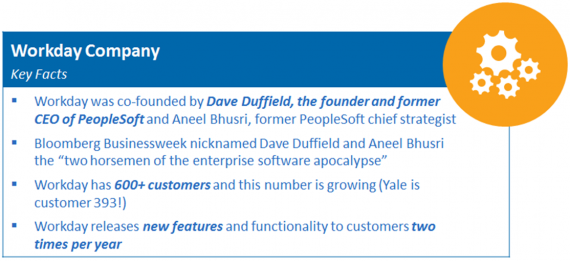
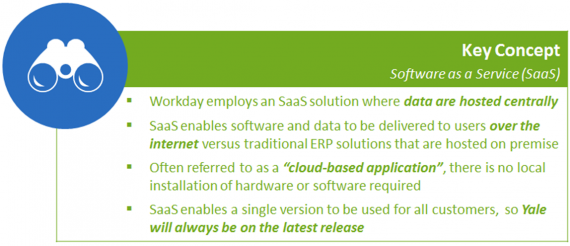
We want to hear from you! If you have any feedback, comments, or questions, email us at workday@yale.edu.
Welcome to the October edition of our monthly e-newsletter, Workday@Yale, with information on the University’s transition to the campus-wide unified Human Resources, Payroll and Finance information system, Workday.
Workday Features
Is Workday an improvement compared to our current systems at Yale? Read about some of Workday's Features that will be a welcome improvement!

Today at Yale, activities such as viewing your pay, accessing your personal information, or changing your benefits take place in three separate systems, which can often feel clunky and disjointed. With Workday, all of your employee information--compensation, benefits, contact information, etc.--will be housed in one single location, simplifying service and improving communication across the University.
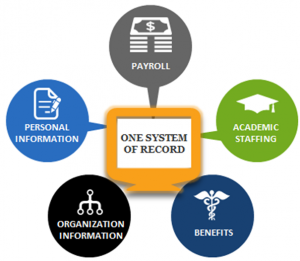

Workday prides itself on a clean, clutter free design, developed with the user in mind. The homepage (pictured below) looks similar to many consumer websites we know and use today. You can quickly and easily personalize this screen, just as you would personalize your smartphone today, to display the information you need most.
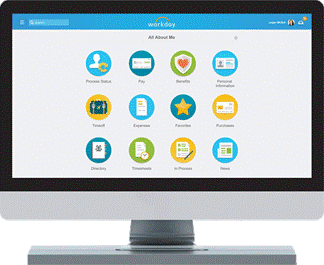

Workday's use of icons allows navigation in the system to be even more intuitive.
|
Related Actions |
Actions that are available to you (based on security) will become visible upon hovering and can be selected to open the available actions |
|
| Prompt |
Any time you see this symbol, you can click to expand a box that will contain a list of available options. |
|
Menu |
The Main Menu drop down icon houses landing pages, dashboards, and documentation from Workday Community. | |
Home Page |
At any time, you can click the Workday logo at the top center of the screen to return to the Home Page. | |
Inbox |
All tasks and notifications from the Workday system are sent to your Inbox for review or action. |
For more information on the Workday Inbox, click here.
Core Concepts
Workday employs a Software as a Service (SaaS) solution. What does this mean? 
Often referred to as a “cloud-based application”, SaaS enables software and data to be delivered to users over the Internet versus traditional ERP solutions that are hosted on premise. Characteristics of SaaS include:
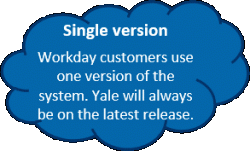
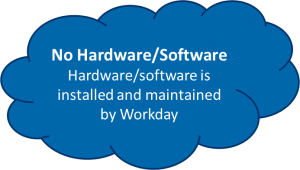

Looking For More Information About Workday Concepts?
Click here to access the SaaS Concept and many more Workday Core Concepts.
What features do you like best about Workday?
The Workday@Yale Change Management (CM) team recently sat down with Corey Rossman in Human Resources to find out about some of the exciting new features of Workday. Read more...
Workday@Yale Community Meetings – coming soon!
Yale is preparing to transition to a new enterprise system called Workday, and the Workday@Yale Change Management team wants to be sure staff and faculty at Yale have the information they need about this program. In that effort, the Workday@Yale team will be scheduling Community Meetings around campus to keep everyone informed. Read more...
Follow Workday on Twitter!
Workday provides frequent posts on their Twitter Account to inform followers about all things Workday.

Workday’s Twitter is a great resource to learn about Workday, watch interviews with Workday customers, read relevant blogs, and more. Follow Workday (@Workday) on Twitter to remain up-to-date with the latest and greatest information!
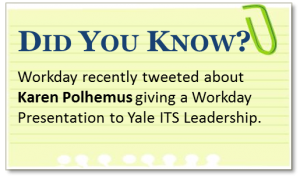
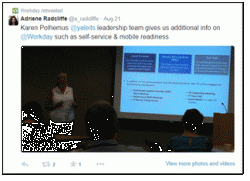
Check out Workday's re-tweet here!
Subscribe to Workday@Yale Newsletter
You may subscribe to the Workday@yale Newsletter here.
Welcome to the November edition of our monthly e-newsletter, Workday@Yale, with information on the University’s transition to the campus-wide unified Human Resources, Payroll and Finance information system, Workday.
Program Update
The HR/Payroll team is moving into the Testing Phase of the timeline. During this phase, they will be focused on validating the functional configuration of Workday with Yale’s HR/Payroll business processes. The Reporting team continues to make progress and has begun building reports by order of their need in the test cycles. Other progress includes data clean-up and validation activities in preparation for Release 1 (HR/Payroll) in April 2015. In addition, the Program Team is reviewing Service Group recommendations and scheduling several Community Sessions each month to provide relevant Workday information and address questions from the broader Yale Community.

The Change Network at Yale is comprised of Unit Leaders and their Change Partners, who were recently identified across all units to champion changes like the Workday@Yale business transformation. Change Partners will support Workday@Yale by fostering communication and increasing readiness among members in their unit. The Change Network will serve as our deployment “front-line” to prepare the community for the transition to Workday. In addition, members of the Change Network are:

Over 200 people attended the Change Network Kickoff Sessions, held October 6th and 7th to provide a Workday overview and familiarize Change Partners with their new role.
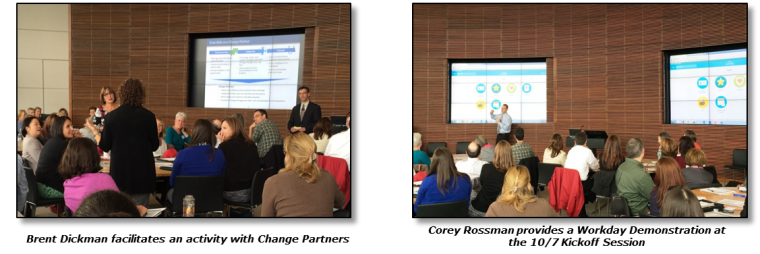
Workday Features
Today at Yale, it can take weeks for newly hired faculty and staff to gain access to all the systems they need to perform their jobs. Workday@Yale is partnering with the Identity & Access Management (IAM) team to expedite the onboarding processes by eliminating manual processes and paperwork used to collect onboarding information. As a result, Workday will enable faculty and staff to onboard more quickly than they do today.
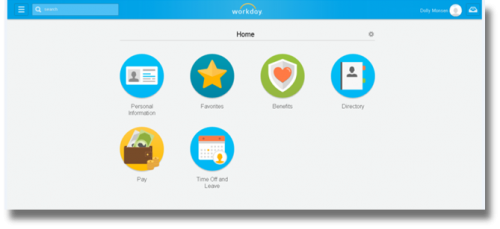
Workday Offers the Ability to:
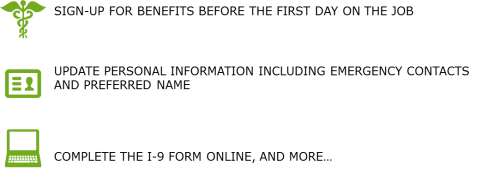

You may be hearing that Workday is configurable, but it is not customizable. What does this mean?

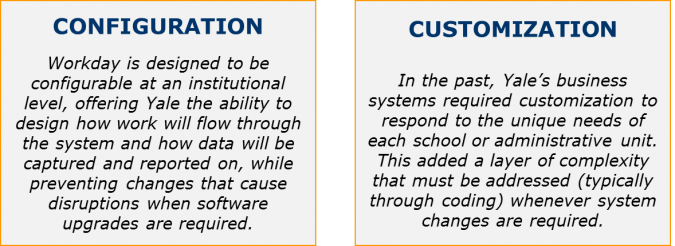

Looking for more information about Workday Concepts? Click here to access many more Workday Core Concepts.

In an effort to provide the Yale Community with key information about Workday, the Program will be hosting Community Meetings around campus.
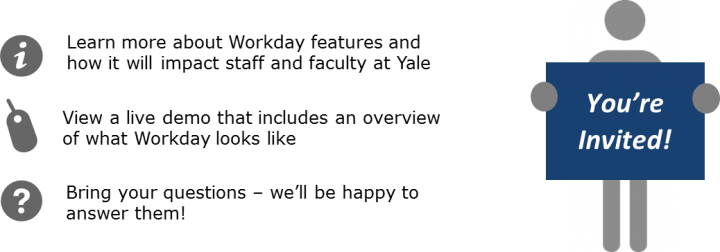
All are welcome to attend! We look forward to seeing you there.
To attend a Workday@Yale Community Meeting, please register here.
Welcome to the December edition of our monthly e-newsletter, Workday@Yale, with information on the University’s transition to the campus-wide unified Human Resources, Payroll and Finance information system, Workday.
How will Workday Facilitate our Work in April 2015?
We’re almost three months away from Release 1 Go-Live of Workday@Yale. As we move toward this transition, the Program Team will be providing more detail around how your day-to-day work may change as a result. For example, today at Yale, it takes up to eight clicks to access or make any changes to your benefits information (aka your benefit “elections”) from the Yale Portal. By the time you reach your benefits page, you likely have three or four browser windows open. Your information is located on a static page, with beneficiaries broken out in a separate chart at the bottom of the page.

In Workday, you can access your benefits information with just two clicks from the Home Page. You can sort, filter, export to Excel, or print the information. All benefits in which you’re enrolled are listed in one chart, including any dependents and beneficiaries you’ve elected for each benefit. Workday is interactive, so you don’t need to click “back” to retrace your steps; you can navigate to most pages in Workday with a few clicks of the mouse.
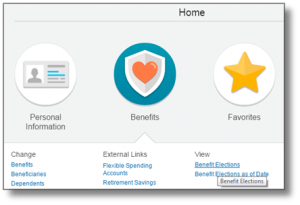
View your Benefit Elections with just two clicks.
Other Ways in which Workday will make our work day run more smoothly include:
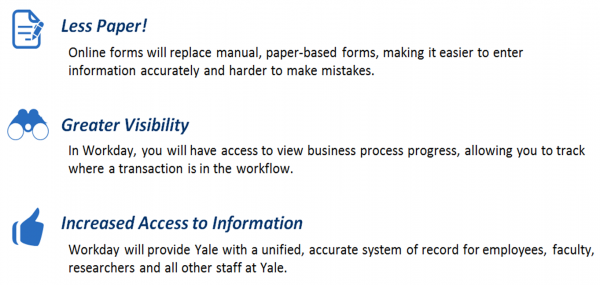
Preview Workday@Yale

Be on the lookout for more Community Meetings in January and February, where you can view a live demonstration of Workday's functionality, look and feel. Register for an upcoming Workday@Yale Community Meeting by visiting http://calendar.yale.edu/cal/workday.
Feedback from attendees has been positive, and includes comments such as:
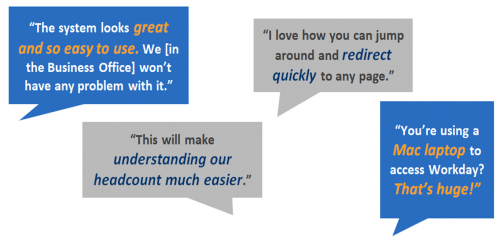

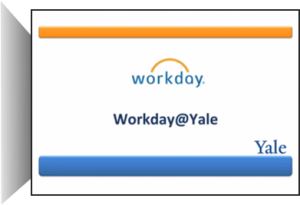
Curious how Workday may look when we go live at Yale University? Watch a brief video demonstrating Workday's basic functionality by accessing the Workday@Yale Preview. This preview will familiarize you with Workday and how easy it is to use. The video also shows several self-service activities such as direct deposit and maintaining your personal information.
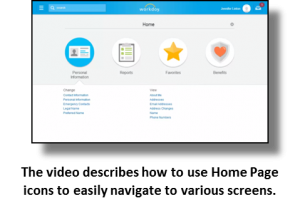

Each month, this section introduces a new Workday Core Concept to help prepare you for the transition to Workday. You can start building your knowledge of Workday now by reviewing the full repository of Workday Core Concepts, here.
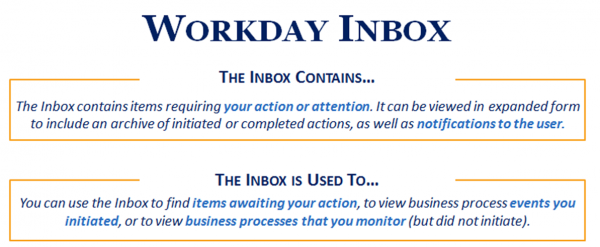
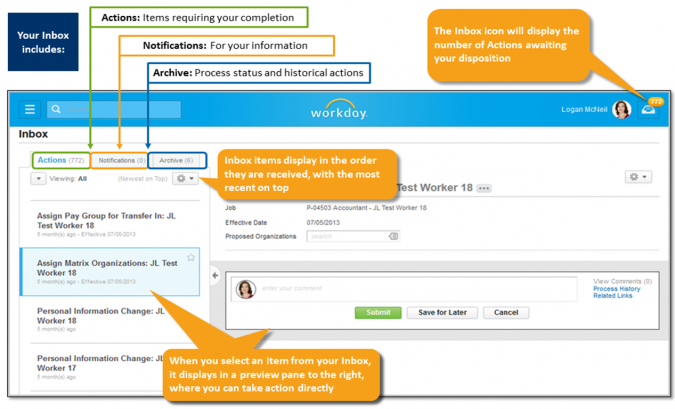
Community Perspectives
 The Workday@Yale Change Management team recently interviewed Jack Beecher, Senior Director of Business Operations for the Professional Schools and Academic Support Units to learn more about his experience as a member of the Position and Compensation Management Service Group.
The Workday@Yale Change Management team recently interviewed Jack Beecher, Senior Director of Business Operations for the Professional Schools and Academic Support Units to learn more about his experience as a member of the Position and Compensation Management Service Group.
CM: Have you been involved in past system implementations at Yale?
JB: Yes! The Oracle implementation really set the stage for the future and helped us to develop a common language, but it was a different time then, and the idea of “software as a service” hadn’t been conceptualized in 1998.
CM: Have you encountered any issues?
JB: As with any system implementation, the underlying presumption is that Yale is homogenous; clearly Yale is not. The one-size-fits-all approach doesn’t and shouldn’t work, which people are growing to understand. Workday should serve most of Yale very well, and then we will accommodate where it’s unavoidable. Workday is a big step in the right direction, and I wish I had another ten years at Yale in order to experience it fully.
CM: What do you like about Workday@Yale?
JB: Workday’s ability to adjust and respond to the changing environment is an improvement from the old systems. They’re inventing solutions as the problems arise.
I also like the idea that you can log into Workday and see what work others are depending on you for, as well as the work you are expecting to be done by others. I believe users will find the interface intuitive and easy to use. Workday’s architecture is preparing us for the next ten years.
CM: What can you tell us about the work being done on the Workday Finance workstream?
JB: Workday Financials will offer a much more effective and easier to use chart of accounts. Workday@Yale is not an upgrade to existing software; it’s a transformational approach to how we use our administrative financial systems, and people are eagerly anticipating this modernization.
Program Update
The Workday@Yale Program is well into the Testing Phase, which will end in early February. Training materials to support HR Information and Payroll Processing are being developed and tested as well, for use beginning in February and March. The Release 1 Timeline below is focused on activities leading up to the first Workday deployment at Yale and highlights past accomplishments, current work, and next steps.

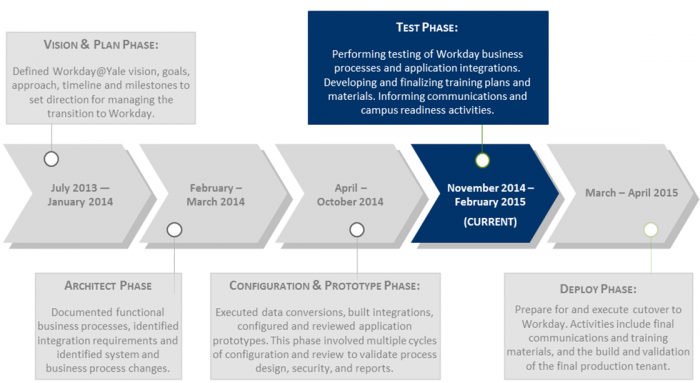
Next Month
In the New Year, you can expect to:
- Receive further information around training plans and materials that will be available as we approach Go-Live.
- View live demonstrations of Workday functionality at Community Preview Meetings
- See a new “Workday is Dawning” poster across campus, the second poster in the awareness-building campaign. Check out Poster #1 below!

Welcome to the January edition of our monthly e-newsletter, Workday@Yale, with information on the University’s transition to the campus-wide unified Human Resources, Payroll and Finance information system, Workday.
Workday will automate a variety of activities that are completed manually today—from collecting signatures or approvals on a form, to tracking the status of a routine process, such as updating your contact information.
Today at Yale...
You may fill out a form for a variety of reasons, such as to update your contact information, set up direct deposit, or to request a Leave of Absence. Once you submit the form to the appropriate individual/office by email or in person, it’s difficult to track the status of the piece of paper once it leaves your hand.

In Workday...
Once initiated, you can view the steps in a business process and see who is responsible for performing the next step. Similar to how we use UPS to track a shipment as it moves to its final destination, Workday allows us to track activities through to their successful completion.
Compare: Workday and UPS
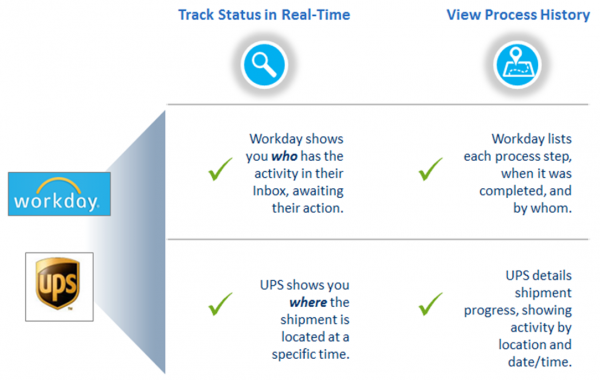
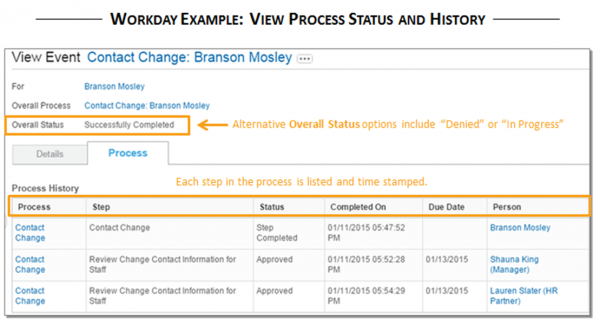

Are you curious where you’ll go to get things done after Workday goes live? View a table detailing activities that will be conducted in Workday with Release 1.

Join us for the second round of Workday@Yale Community Meetings. These meetings will feature updated topics, training tips, and demonstrations of different Workday functionality. View meeting topics and register for an upcoming session.
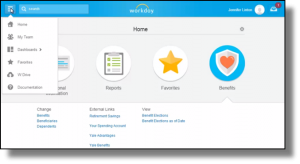
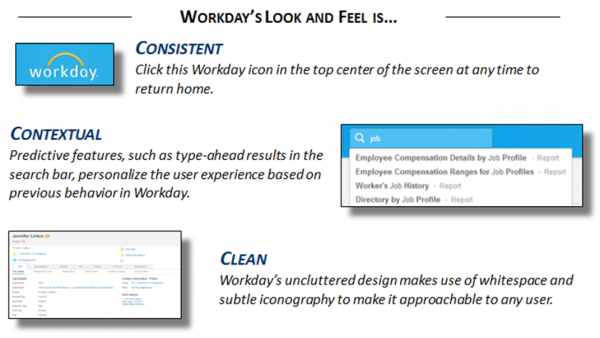

Each month, this section introduces new Workday Core Concepts to help prepare you for the transition to Workday. Review all Workday Core Concepts here.



![]()
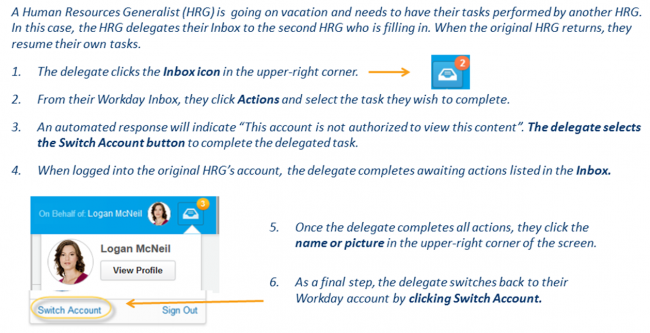

Speak the Workday lingo! Below are definitions for common Workday terms. Impress your colleagues by incorporating one or two of these into your everyday conversations! To review more terms and definitions, visit the Glossary of Terms on the website.
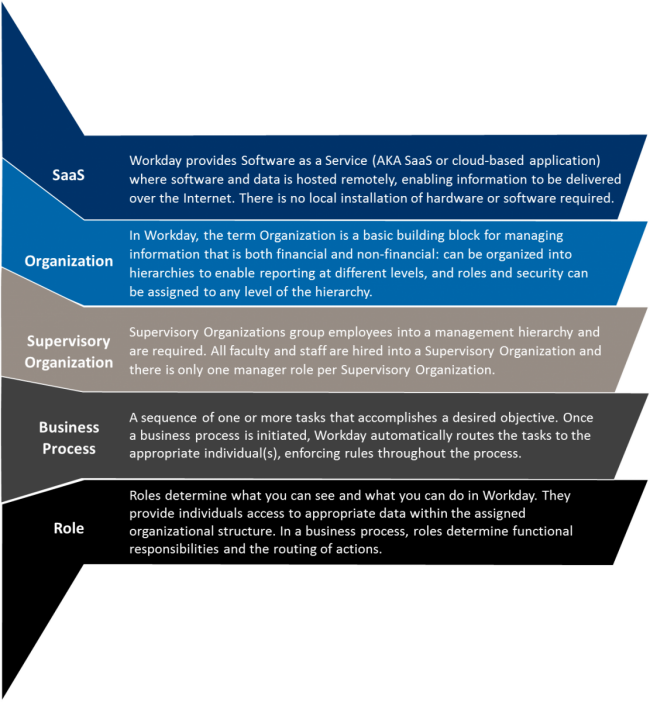
Welcome to the February edition of our monthly e-newsletter, Workday@Yale, with information on the University's transition to the campus-wide unified Human Resources, Payroll and Finance information system, Workday.
Program Update: Workday@Yale Release 1 Schedule
The Workday Steering Committee has decided to extend the Workday testing phase to complete comprehensive testing of Yale’s multiple payrolls and complex benefits systems and ensure proper integration with existing university systems. This will allow for a smoother transition for business units and program leaders. As a result, Workday Payroll go-live is scheduled for late June.
For complete information about the schedule for Workday Release 1, please take a moment to review the detailed message recently distributed by Shauna King and Nancy Creel-Gross. A snapshot of the schedule for Workday Release 1 follows below:
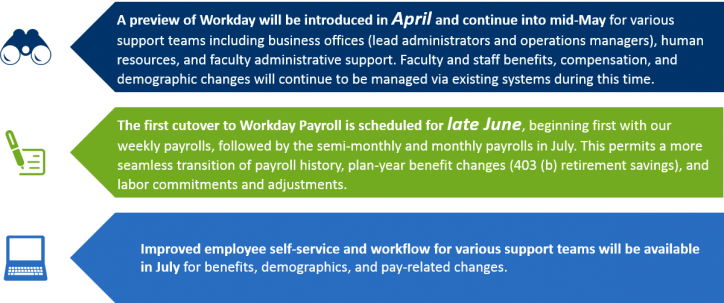
The implementation of new finance, HR, and payroll systems require seamless integration and high-quality functionality with Yale’s other administrative and payroll systems. This schedule assures a smoother implementation and supports an improved user experience for the Yale community at go-live and beyond.
Simplifying Reporting in Workday
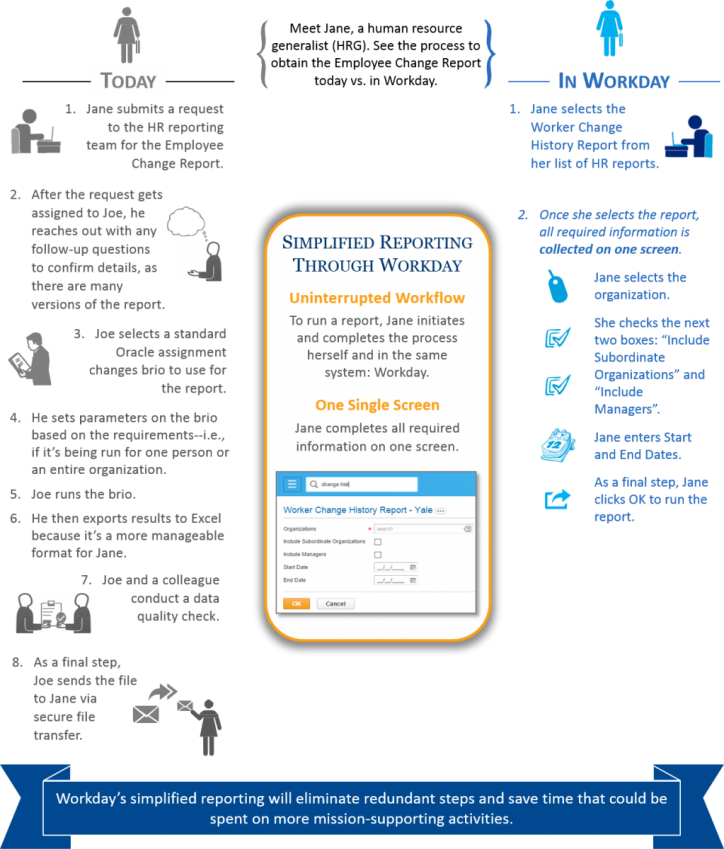
Workday Webinar Brings Teams Together
Gathering attendees together from all parts of campus for meetings is a challenge—then add snow and ice into the mix. The Workday Change Partner Network did some quick out-of-the box thinking and held a webinar instead.
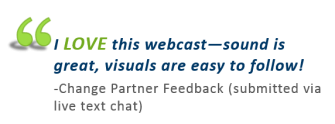
On January 29th, over 80 participants from the Workday@Yale change management team, human resources, the change partner network, and business operations, tuned in to the inaugural Workday@Yale Change Partner half-hour webinar to learn more about the Workday Release 1 launch schedule.
Jen Cinque, director of Staffing, invited her team to participate so all could hear first-hand how changes will impact them as Workday becomes our new reality. Jen felt that the webinar was a successful delivery format, especially as it was so inclusive.
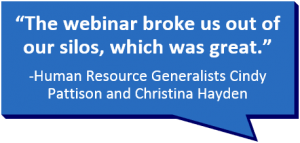
Dick Bascom, Workday@Yale change management lead, hosted the webinar and presented further details about the Workday Release 1 timeline. Dick was assisted by Brent Dickman, executive director for Business Operations, who answered questions in a live chat format.
The ability to directly communicate with audiences and teams campus-wide, with no time lost traveling to and from a meeting, proved to be an efficient use of 30 work-day minutes and a practice that the Workday@Yale team will be sure to employ again soon.
Core Concepts
Each month, this section introduces new Workday Core Concepts to help prepare you for the transition to Workday. Review all Workday Core Concepts here.

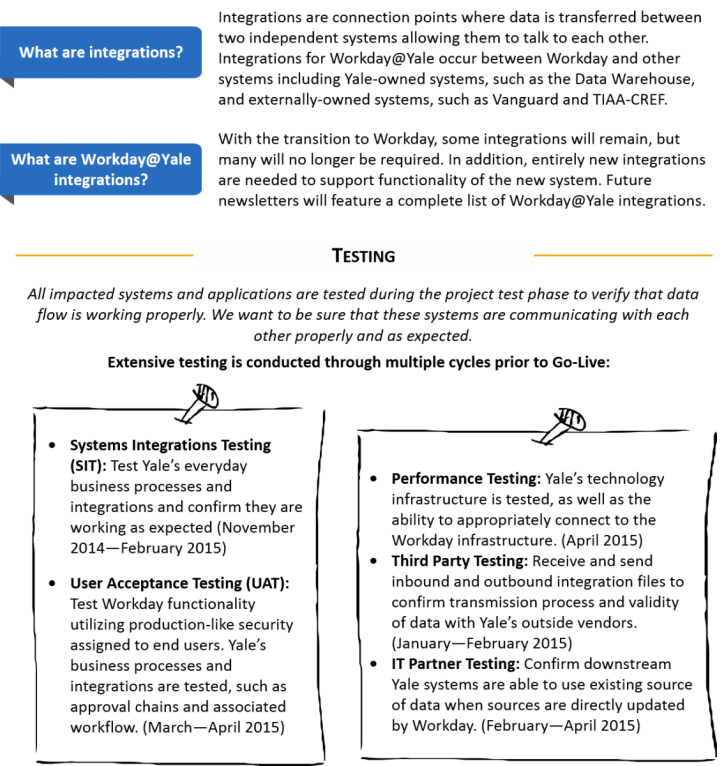
In the Know with Workday Lingo!
Take a look at the Workday naming conventions presented below. It’s easy to become familiar with Workday terms—and impress your friends and colleagues.
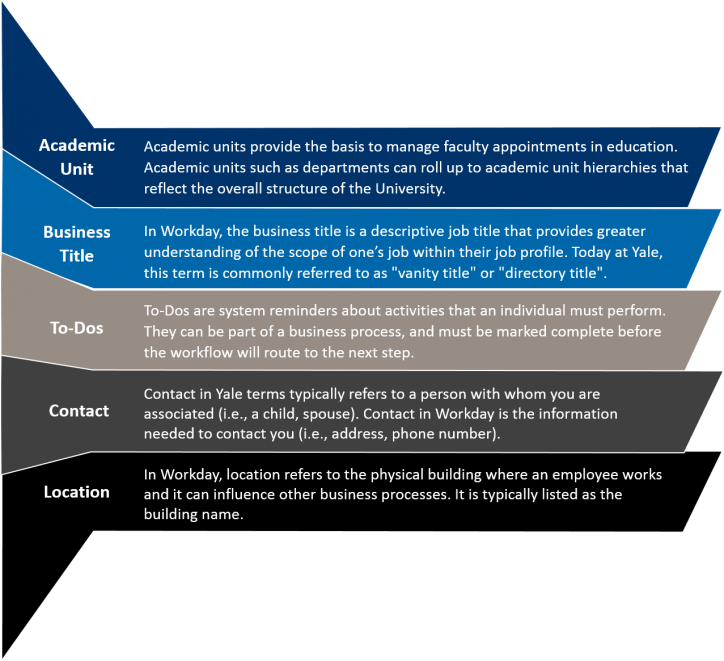
Register Now: Workday@Yale Community Update Meetings
Want to know more about Workday? Register for an upcoming Workday@Yale Community Meeting, now in its second round. You will learn about updated Workday topics, training tips, and view a live demonstration of different Workday functionality. View upcoming meeting topics and register for an upcoming session here. Sessions are continually added, so check back frequently to find a convenient meeting that fits your schedule.
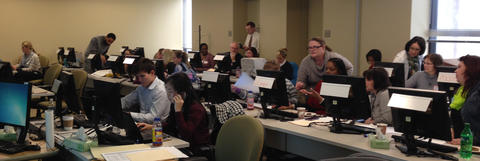
Our transition from Oracle to Workday@Yale is a significant transformation effort, with countless checks and balances going on behind the scenes to ensure Workday serves the diverse needs of the Yale Community. To support the Workday@Yale HCM and Payroll go-live at the end of June, the program team is currently executing a critical activity called “User Acceptance Testing” (UAT), which spans approximately 6 weeks.
Participants include real world end-users— teams of lead administrators, human resource generalists, and other support staff— who represent about 25 schools and departments across campus. UAT participants test the workflow of various business processes, approval chains, reports, and Workday roles to verify that they function as expected. This activity also validates training guides under development. As any procedural questions arise, the self-help instruction sheets are referenced to ensure correct answers.
“UAT is a great opportunity to see all the business processes working together, test functionality, and experience how easy Workday is to use,” explained Nancy Creel-Gross.
UAT helps ensure that the system is working as designed in order to meet the Yale’s diverse needs. Many integrations with Yale’s systems have been designed and tested and the data from Yale’s current systems has been converted for use with Workday. As Workday is configured for Yale business processes, each future release of functionality will be tested through a variety of scenarios. Upon the completion of UAT, Workday@Yale will take another step closer to becoming an everyday reality.
|
Marcella Simpson, customer service representative, Employee Service Center ESC |
Today, Yale's Employee Service Center (ESC) is your primary resource for assistance with your employee benefits, pay, and personal information. That won’t change with the implementation of Workday. In fact, Workday@Yale-related emails and calls after July 1st, will be expertly fielded by ESC staff members who are currently undergoing comprehensive training to ensure that your inquiries receive an effective and efficient response.
Robin Howard, Yale’s ESC supervisor, and her staff are very excited about Workday’s launch on July 1st and look forward to working with the new Workday system. Robin explained the process her staff will undertake whenever an inquiry regarding a Workday payroll, benefits, or personal information is received by ESC staff:
- When the ESC receives an inquiry, it is assigned a specific reference number that is used for all correspondence related to the specific request. In addition, the ESC is able to track what inquiries are most frequently raised; this will help the Workday@Yale program team make any adjustments regarding communications, or training, for example.
- The ESC then answers the question or refers the inquiry to a subject matter expert who provides a resolution to the issue for the employee.
|
Tonya Whitelow, customer service representative, Employee Service Center (ESC) |
Workday presents the ESC staff with the opportunity to resolve employee inquires with greater efficiency. Robin feels this will result in improved customer service, which is the ESC’s number one priority. “I welcome any new updated system that improves our ability to provide world-class customer service to the Yale community, and Workday will certainly do that,” she enthusiastically noted.
By now, many of you have heard about Workday@Yale, which will become available on our desktops on July 1st. Workday is more than just new technology. For faculty and staff, Workday will bring many self-service features, such as viewing and managing our personal information, details around our pay, and benefit elections all in one secure place.
With Workday@Yale, our complex administrative and business processes will become more simplified, accessible, and unified across campus. Now, it is your turn to help spread the message!
Please share this introductory video with your colleagues to increase awareness of Workday—perhaps as a lead-in to your next unit meeting— so that every single faculty and staff member at Yale understands why it is such important news.
Before we know it, Workday@Yale will be an everyday part of our workday lives!
When Yale transitions to Workday on July 1, faculty and staff will be able to view and manage information related to benefits, pay, and personal information—right through Workday. Click the banner below to read more about what Workday means for you, who to contact for additional support, and how to log in to Workday for the very first time!
Intuitive and easy to use, was the message conveyed through the recently held Change Partner webinar. Guest presenter, Kathi Goodfriend, demonstrated how one can easily navigate within Workday and access information with just a few mouse clicks.
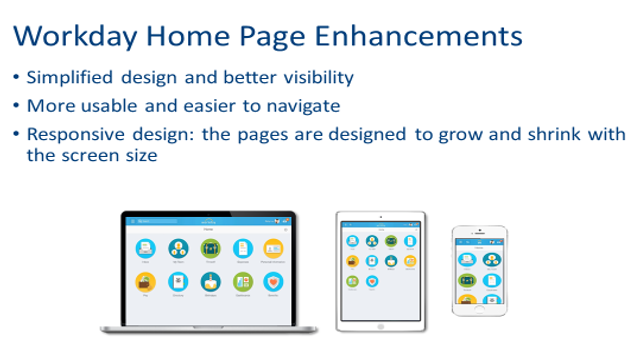 |
Kathi presented several enhancements that Workday has made to the user interface in the most recent release, called Workday24. Workday made almost all of its most recent improvements in response to suggestions and feedback from Workday clients. It was encouraging to learn how receptive Workday is to customer feedback.
Enhancements:
- Using responsive design technology, Workday screens now automatically resize to fit any device, including mobile phones, tablets, and laptops.
- Formerly tiny text and links are now large buttons, making it easier to see and tap with your finger if using a touch-screen device.
- The search bar was redesigned to combine three drop-down menus into one, and a “Home” button was added, making it easier to return to a familiar starting point.
- The new animated organizational chart feature allows users to navigate our org chart for any department on campus.
This webinar featured an interactive chat screen that allowed participants to both ask and answer questions during the session. A polling function encouraged audience participation and immediate feedback regarding both technical issues as well as webinar content. The result was an effective and engaging webinar meeting.
Workday is a dynamic and powerful application that will simplify how we access information and do our work. Many staff members who have participated in user acceptance testing and preview sessions have shared how easy and intuitive it is to use Workday. In addition to training and demonstration sessions, faculty and staff will now find helpful Workday training guides to support the transition to Workday on the Workday@Yale site.
There may be times, however, when one may have technical questions or want additional guidance on various business processes. There are service centers available to field your questions. Here’s how to get help when you need it:
|
Who |
Support for these Areas |
Team |
Contact |
|
All Faculty & Staff |
|
Employee Service Center |
Phone: 203-432-5552 Email: employee.services@yale.edu Hours: Monday – Friday, 8:30 a.m. to 5:00 p.m. |
|
All Faculty & Staff |
|
ITS Help Desk, DSP’s and other IT support providers |
Phone: (ITS Help Desk): 203-432-9000 Hours: (ITS Help Desk): Monday – Friday, 7:00 a.m. to 6:00 p.m. Email: (ITS Help Desk): helpdesk@yale.edu |
|
OFAS and Faculty Affairs |
|
Academic Support |
Phone: 203-432-5552 Email: employee.services@yale.edu Hours: Monday – Friday, 8:30 a.m. to 5:00 p.m. |
Training for business processes are tailored for designated Workday roles. If you have questions about which business process training to attend, please confer with your change partner, lead administrator or human resource generalist.
Today at Yale, to find contact information for a Yale faculty or staff member, you might first consult the Yale Directory. Provided you know the name of the person or organization, you can retrieve information including their name, location, phone, and email. To locate the individual’s organization or team however, you might have to reference different sources.
The Workday directory will provide more search options and display people’s information with organizational charts—right in one secure location.
|
|
Here are some examples of Workday’s advanced search options:
· You may know only the person’s name or their supervisor, but that is enough. Typing a partial name in the Workday search box will generate a list of names containing the letters in the sequence you’ve typed, as well as any organizations managed by those people. If you don’t see a match, simply type more letters or press Enter on your keyboard to see all matches.
· Find a colleague by typing in their business title or organization name.
· All Yale employees will be able to find and view another employee’s general contact information, their manager, co-workers, and organizational structure.
Workday will provide easier and secure access to information everywhere we turn, allowing faculty and staff throughout the Yale community to connect with one another in simpler, faster, and more effective ways.
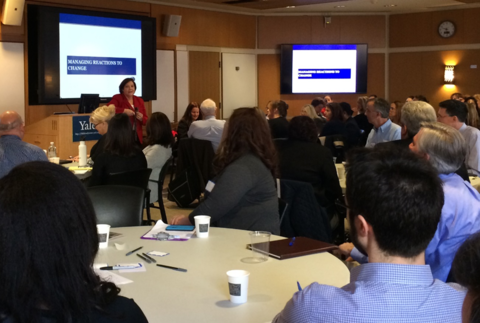
The monthly Change Partner meeting on April 15, featured a special update from Shauna King, executive sponsor of the Workday@Yale program, and testimonials from User Acceptance Testing (UAT) participants.
A chance to make a lasting impact
A system implementation like Workday is a once-in-a-decade opportunity to make improvements in Yale’s human resources, payroll, and financial systems. The Change Partners have been key participants in sharing information and supporting the transition to Workday on the unit level.
Shauna King emphasized that the Workday project has been intentionally structured to engage the end-user community—to do this “together”— in a variety of ways. Shauna encouraged the Change Partners to continue their good work and reminded them that they too, were owners of the outcomes. “It is a hugely important role that we’ve asked you to play and it is the role of an owner. You are deploying Workday. We are all deploying Workday,” she added. Shauna echoed the UAT participant experiences with Workday—search capability, data at one’s fingertips, and the ease with which to retrieve and share information.
First-hand experience
Some of the Change Partners who attended UAT included Sonja Beamon-Rezendes, Administration; Jennifer Mulligan, Dermatology; Denise Krause, University Library; Kyleen Kolomick, Human Resources; Ian Solomon, Internal Medicine; and Will Walker, Forestry. They enthusiastically shared their testing experience with Workday, noting its overall user-friendliness and intuitive and modern functionality:
- Transparent business processes: there is visibility into the process; one can see who takes the next step in the transaction—no more guesswork—and its status in real time.
- Dashboards and Reporting: human resource generalists, human resources staff, lead administrators and operations managers can access dashboards and drill down into data. In an FTE report, one can now see who is included as part-time and full-time employees. One can run reports—trends over years, diversity data, turnover metrics, number of faculty or post doc fellows— and get results in seconds rather than days.
- Flexibility: to change compensation for an employee, one can search for the employee first and then click the process, or start the process and then search for the employee.
- Serving faculty: information regarding faculty appointments and term end-dates is easy to view and easier to share with faculty when they request it.
- Training guides: the guides are very helpful, but the system is so easy to use, they aren’t necessary for long.
With the many people, teams, and groups working hard to ensure that Workday is ready for go-live on July 1, the promise of a new workday will soon become reality.
Go to top
The Workday@Yale Change Partner network supports the program’s strategy of utilizing broad community engagement to foster awareness and personal understanding of how Workday may impact faculty, students and staff.
By serving as communicators, supporters and listeners, Change Partners:
- Demonstrate personal commitment to Workday adoption
- Integrate the program into discussions and activities
- Enable more effective communication about workday throughout our diverse community
- Provide Workday@Yale change management team with insight into any program-related issues that employees may be facing
| COMMUNICATOR | SUPPORTER | LISTENER |
|---|---|---|
|
Share general information about the program through formal and informal channels Provide feedback to the project team |
Encourage, coach, and support managers and staff through the transition to Workday Help prepare units for the Program implementation |
Identify any areas of concern Address employee questions Gather feedback from colleagues |
To find out the Change Partner your unit, please see the listing of Workday@Yale Change Partners on the Workday@Yale website. They look forward to building community readiness for Workday with you!
 In Workday, your pay slip may look a little different, but all the important information is still there. Take a moment to learn how to view and print a copy of your pay slip by previewing the training guide here.
In Workday, your pay slip may look a little different, but all the important information is still there. Take a moment to learn how to view and print a copy of your pay slip by previewing the training guide here.
Remember that once Workday goes live on July 1, you will not be able to view your actual Workday pay slips until after you receive your first paycheck in the new system.
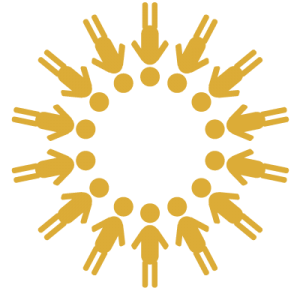 Representing a diverse group of staff from the Yale community, the 156 members of the 13 service groups chartered by Business Operations, offer their perspective regarding the designs for Workday@Yale. After gaining an understanding of the new processes and workflows, service group members review Workday functionality and provide meaningful feedback to the program team.
Representing a diverse group of staff from the Yale community, the 156 members of the 13 service groups chartered by Business Operations, offer their perspective regarding the designs for Workday@Yale. After gaining an understanding of the new processes and workflows, service group members review Workday functionality and provide meaningful feedback to the program team.
To date, 60 categories of recommendations have been submitted to the Workday program team. A majority of the recommendations have been incorporated into the first release of Workday@Yale, and many others are under consideration for inclusion in future releases.
Meghan Dahlmeyer, service group lead for Accuracy of Unit Financial Statements, explains, “We’re striving for simple processes (fewer steps) done in a standardized way (consistency), which allows us to view financial information that we trust is accurate and that provides the information we need in order to make sound business decisions.”
Service group members have received training on a variety of different topics related to effectively working on service initiatives. “I learned so much from the training that was available to us as service group leaders, and I learn even more each week from the discussions at our service group meetings,” offered Meghan Dahlmeyer, “I would absolutely recommend that others participate in activities like these.”
Service groups will exist even after Workday is implemented. Please visit the Workday site to read more about service groups.
People all over campus are excited and getting ready for Workday@Yale’s rollout this summer! As Robyne Gioco stated, “Testers who have been able to go into the system have been amazed at how easy Workday is, from the very first moment they got into the system and started playing with it.”
Both Robyne and Cindy Pattison, human resource generalists, see a “Let’s go” attitude when they present information about Workday to their colleagues. The Workday home screen’s unexpectedly colorful and interactive features make it fun and entertaining unlike many business programs, which are static and bland.
“This (Workday home screen features) is good because it intrigues people and makes everyone want to get in and use Workday to get their work done,” commented Cindy. Now that the word is out from peers who participated in user testing, everyone seems eager for Workday Release 1 to arrive on July 1st.
Go to top
The Workday@Yale Training Plan for Release 1 is shaped by the key business processes, system roles and faculty/staff audiences. A variety of training opportunities will be made available (see below), and options will be tailored to your future use of Workday.
|
|
Available Training Opportunities |
|||
|
Instructor-Led Training |
Auditorium Sessions |
Training Guides |
Web-Based Training |
|
|
Employee Self-Service |
||||
|
HR/Business/Academic Roles For example:
|
|
|
|
|
This blended learning approach, based on their Workday roles, provides faculty and staff with a flexible learning experience to match the diverse needs of Yale’s schools, departments and units.
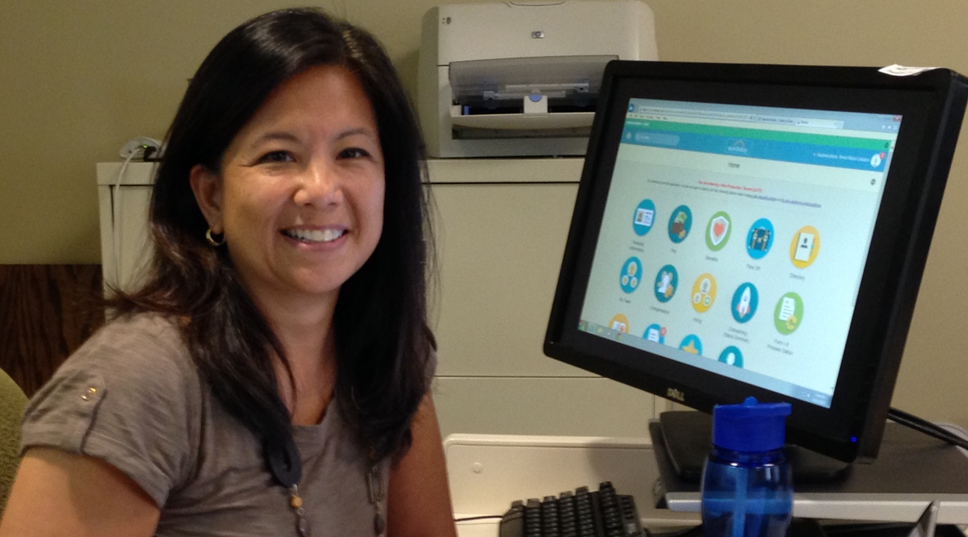
One of Workday’s key enhancements is that it will become Yale’s new “Academic Information System.” It will be more than a human resources and payroll system. Anna Maria Hummerstone, director of YSM Faculty Support and Workday@Yale Academic Information team lead explained, “Workday will serve as Yale’s central repository of all academic appointment information, both past and present.”
Beginning July 1st, Workday will provide a more efficient way to track individuals who hold academic appointments across the university. In this one central system, Workday will become Yale's campus-wide system of record for appointments, named professorships, term dates, faculty categories and contact information. A goal is to eventually expand the information to include academic credentials, certifications, and research information, making Workday an even more valuable tool, though this may take a few years to realize. Student and curricular information are not included, however.
Members of the Yale community will recognize how easy it is to navigate Workday and access the information, especially when they need to search for peers, departmental teams, and faculty member information. For example, after July 1st, individuals will be able to log into Workday, type in a department name, such as English, and view a directory of all those who hold an appointment in that Workday “academic unit.”
In addition, individuals with an academic administrative role will find it easier to compile faculty reports across departments. Recently, the Office of Faculty Affairs was asked to provide a list of all named professorships throughout Yale. This was a cumbersome, labor-intensive process because the data had to be manually compiled from multiple systems at many offices. Within Workday, this information can be composed in one report— generated within seconds.
Workday’s roll-out over the next few years will further Yale’s vision of a more unified campus. As we proceed on this journey, we will continue to build on the solid foundation of an accurate, precise, and detailed academic information system. By compiling faculty and research information all in one place, we will foster even more sharing of interdisciplinary knowledge, which benefits us all.
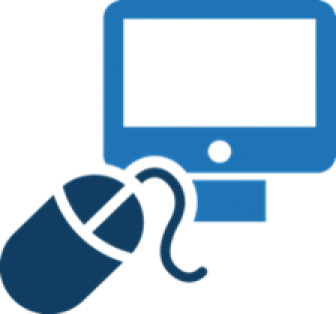 What is employee self-service?
What is employee self-service?
Workday’s Employee Self-Service functionality will allow Yale faculty and staff to view and manage information related to their individual human resources and payroll elections. Employees will be able to initiate actions, including those outlined below:
· Edit personal contact information
· Set up and manage direct deposit
· Edit emergency contacts
· Request leave-of-absence
· Print W-2’s
and much more
What can we expect as Yale employees?
All staff and faculty at Yale can expect:
|
► ACCESS |
Secure and easy to access to your own data, including pay statements, direct deposit information, and benefit choices |
|
► FEWER FORMS |
Less paper and redundant data entry |
|
► MOBILE |
Mobile access to manage your personal information—anytime, anywhere—with a secure internet connection |
Workday is intuitive and easy to use, but here is an advanced look at some of the more frequently used Workday icons and buttons.
|
|
Related Actions |
Click on this button to see which actions and reports, based on role security, are available to you; you can then make a selection. |
|
|
Prompt |
Click this symbol any time it appears to expand a box that will contain a list of available options. |
|
|
Your Profile |
This icon houses links to your Workday Inbox, Notifications, Favorites, and links to Yale Training Guides |
|
|
Home Page (center) |
You can click the Workday logo at the top center of the screen to return to the Home Page at any time. |
|
|
Home page (top left) |
You can also click the home logo at the top left of the screen to return to the Home Page at any time. |
|
|
Inbox |
All tasks from the Workday system are sent to your Inbox for action. Check this regularly. |
|
|
View Team |
From your profile screen, click this icon to view your team’s org chart. |
|
|
View Location |
From your profile screen, click this icon to view details about this location, including contact address, number of employees assigned to this location, etc. |
What does my Workday inbox contain?
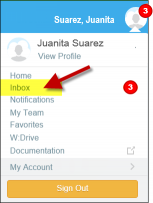 |
Your Inbox in Workday includes tasks awaiting your action and can be viewed in an expanded manner to include an archive of read notifications and completed actions. The number of actions awaiting your attention within your inbox will be displayed in a red circle on your profile icon.
To access your Inbox, click your profile icon, then select Inbox. This brings you to a full screen view of your inbox. On the top left, you will find two tabs, Actions and Archive (see below):
To view your business process tasks, approvals, and to dos, click the Actions tab. Items will remain in the Actions tab until they are completed.
Once completed, the item will move to the Archive tab. The Archive tab includes completed actions, business process events you initiated, and business processes that you monitor (but did not initiate).
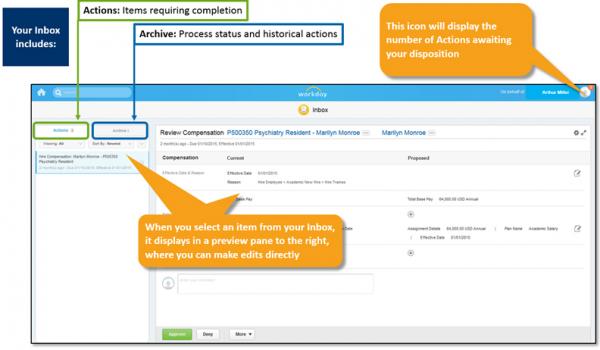 |
Can I sort within my inbox?
Yes. In the image below, the Viewing dropdown menu allows you to select the category of tasks you’d like to view.
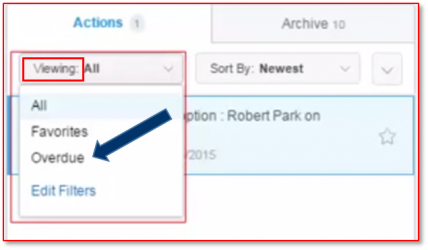 |
The Sort By drop-down allows you to sort by oldest, newest, and due soonest.
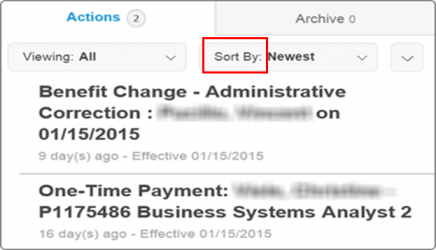 |
Haven’t found a Workday Basics auditorium demonstration to attend that accommodates your schedule? Have no worries, sessions will continue to be held up to Workday go-live on July 1st and afterwards.
Please consult the schedule posted on the TMS site for WD-01: Introduction to Workday for Staff and Faculty at https://bmsweb.med.yale.edu/tms/tms_enrollments.offerings?p_crs_id=5731. These sessions are designed to introduce Yale staff and faculty to Workday, and how to use the system to view and manage personal information, benefits, pay, retirement information and more.

Training guides and support
You can also access Workday training guides and videos, which will be uploaded on a regular basis to the Workday@Yale training page as they become finalized: http://workday.yale.edu/training.
Business Title |
This is the title used to describe a person's position and responsibility;formerly referred to as the Yale directory or vanity title. |
Contact |
Contact in traditional Yale terms is a person with whom you are associated (i.e., a child, spouse, partner, etc.). Contact in Workday is the information needed to contact you (i.e., address, phone number). |
Existing Benefit Elections |
Referred to as Benefits Summary today at Yale. When you view existing benefit elections in Workday, you will see the health and other plan(s) you are enrolled in as well as plans you are eligible to participate in. |
Job Profile |
This is the basic job description that lists the summary of responsibilities associated with a position. These titles are used as a foundation for creating a new job requisition, and are created and maintained by Human Resources. |
Position |
An opening that is created in Workday in order to move or hire staff into a supervisory organization is called a position. The position appears in the supervisory organization with a title and short description. Vacancies appear in a manager’s supervisory organization and remain as unfilled positions until they are either filled or closed. |
For most faculty and staff, your home page will look something like this. It will vary depending on what role you have in Workday.
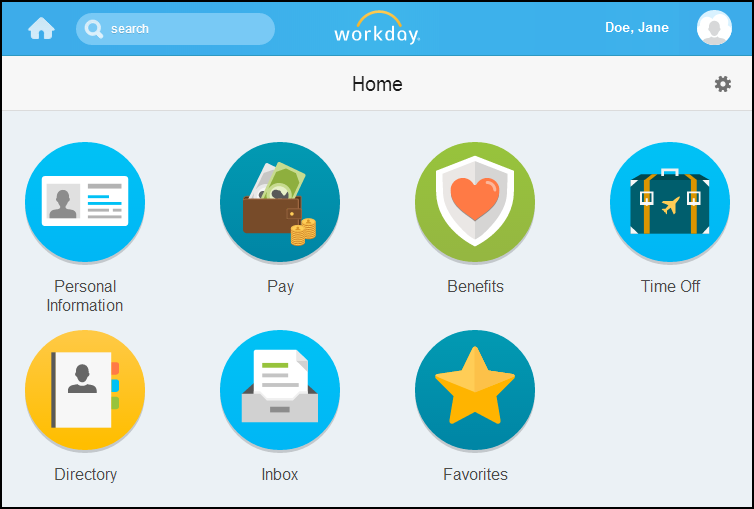 |
|
Actions |
Actions appear in your Inbox under the actions tab and are items that are pending your input, review, or approval in order for the business process to continue through its steps. |
|
Business Process History |
This provides historical record of actions associated with a specific business process. Includes information on the task, step, status, completed on date, due date, and if the process is awaiting action by anyone. |
|
Notifications |
Notifications are housed within your Profile icon, accessible from the Home Page. Notifications are sent to let you know when a business process has been initiated or completed. |
The second round of Workday Community meetings is about to commence. Attending community meetings and getting the information you need will help ease your transition to Workday. The next Workday Community meeting will be held on April 1, 2015, 2:00 p.m. - 3:00 p.m., in the Anlyan Center (TAC), N 107 Auditorium. If you plan to attend, please register here.
To stay informed about additional community meetings and their Workday topics, please consult the Workday@Yale event calendar.
Register for the auditorium style session WD-01 Introduction to Workday for Staff and Faculty through TMS and review the training guide. In addition, you can take the following actions to get ready and stay informed:
- Ask questions of those who participated in hands-on user testing and now have first-hand knowledge of Workday.
- Read the Workday newsletter, visit the Workday website.
- Attend staff and town hall meetings where the agenda features Workday updates and/or demos.
Reach out to your change partner, lead administrator, human resources generalist, or operations manager for answers to questions.
Go to top
